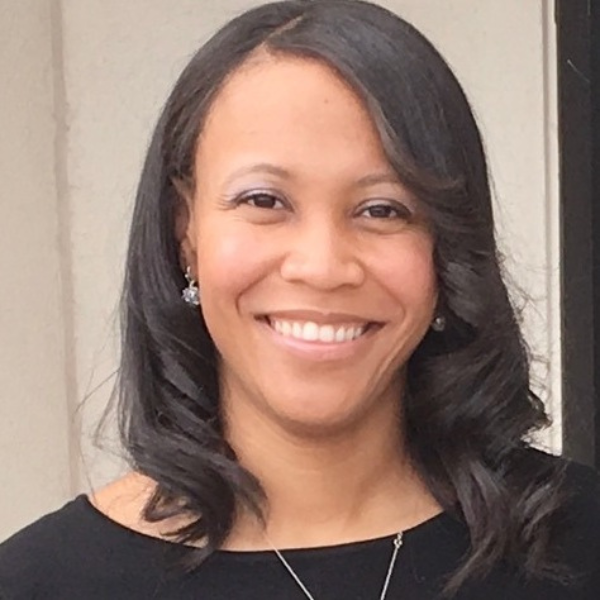LaTeesa James, Health Sciences Informationist

All of the faculty played an integral part in helping me to develop as an information professional.
LaTeesa James is a health sciences informationist at the University of Michigan: Taubman Health Sciences Library. She graduated from Wayne State’s School of Information Sciences with a master of library and information science in 2017. She previously received a bachelor of arts from Central Michigan University and a master’s degree in communication pedagogy from Wayne State.
Q. Why did you choose Wayne State’s School of Information Sciences?
A. I chose Wayne State's School of Information Sciences because I am very familiar with Wayne State and because of the program’s focus on and reputation for producing leaders in library and information sciences.
Q. What area did you specialize in and why?
A. I specialized in academic health sciences librarianship because it is a growing field. I also liked the idea of making an impact on the health and well-being of patients, by assisting clinicians, faculty and health sciences students with the necessary information to help them to make the best evidence-based decisions for patient's care.
Q. Were you active in any student organizations as a student?
A. I wasn’t active in the SIS student organizations, but I was an active student member in professional organizations, such as Metropolitan Detroit Medical Library Group (MDMLG) and Michigan Health Sciences Libraries Association (MHSLA).
Q. How did your involvement with those organizations impacted your student experience?
A. My involvement in professional organizations has provided me with many opportunities to participate on committees, help plan events, assist with the start-up of a mentor program, and participate in conferences, along with a plethora of networking opportunities.
Q. What are you most proud of in your time as a student?
A. During my time as a SIS student, I had the pleasure of serving as the Diversity Graduate Student Assistant. This allowed me to assist students who were looking for and applying for scholarships. I think my happiest experience was when I assisted a student with a personal statement for the Graduate Professional Scholarship and provided her with information about the process. She emailed me that following summer to tell me that she was awarded the scholarship and she thanked me for my help. I know she didn’t get the scholarship because of me, but knowing that I was able to assist her throughout that process was very rewarding.
Q. Was there a professor who really impacted your journey into becoming an information professional?
A. All of the faculty played an integral part in helping me to develop as an information professional. I learned so much about the profession from each one that I had taken a course with, along with some that I had not taken a course with. They all provided me with encouragement and the knowledge to be successful. However, Dr. Deborah Charbonneau was my advisor, and I can say that she has made a major impact on my academic journey. She advised me on what courses would be best for me to take, in order to accomplish my career goals. She advised me on interviewing for and accepting my first position after graduation and how to use that as an entrance into what I want to do in the future. But the biggest impact she has had on my development as an information professional was when she extended the invitation to me to write a review for a scholarly publication with her. Giving me the opportunity to learn from her and to graduate with a publication pending, taught me more than how to write for a scholarly publication. Besides being an inspiration through all of her professional accomplishments, she has been a great example of what it really means to mentor and bring out the best in students. I will emulate her behavior whenever I get the chance as an information professional.
Q. What do you feel is the most important or surprising thing you've learned about the library and information science profession?
A. Once I joined the program, I found the most important thing that I learned about the profession is the need to remember that I am providing a service to people that can alter the lives of others in some way. From providing sources to health sciences faculty for research, to helping a student understand the most efficient ways to us a particular database, I could be contributing to something that could make a great impact on someone's life.
Q. Do you feel that SIS adequately prepared you for your career in the information profession? Any long-term professional goals?
A. I do feel that the program prepared me for a career in the information profession. Besides what I learned through coursework, I completed a practicum, which helped me to see the actual environment I would be practicing in. That experience also gave me the opportunity to do work that I would be doing on a daily basis, as an academic health sciences librarian. My long-term professional goals include contributing to the profession by producing publications for LIS scholarly journals, mentoring students interested in medical librarianship, and helping to increase diversity within the field.
Q. What advice would you give to someone considering SIS?
A. I would advise anyone considering Wayne State's School of Information Sciences a to retain as much as possible from each course that they decide to take. After completing the program, I realized that the "things" and concepts that I was exposed to during the coursework, were actual skills that I was developing and accumulating to use in the field. It's not just about passing the test and getting the good grades for transcripts. It’s all about making sure that students understand and can apply the concepts, since that is what is expected of them once they begin their careers in the information profession.